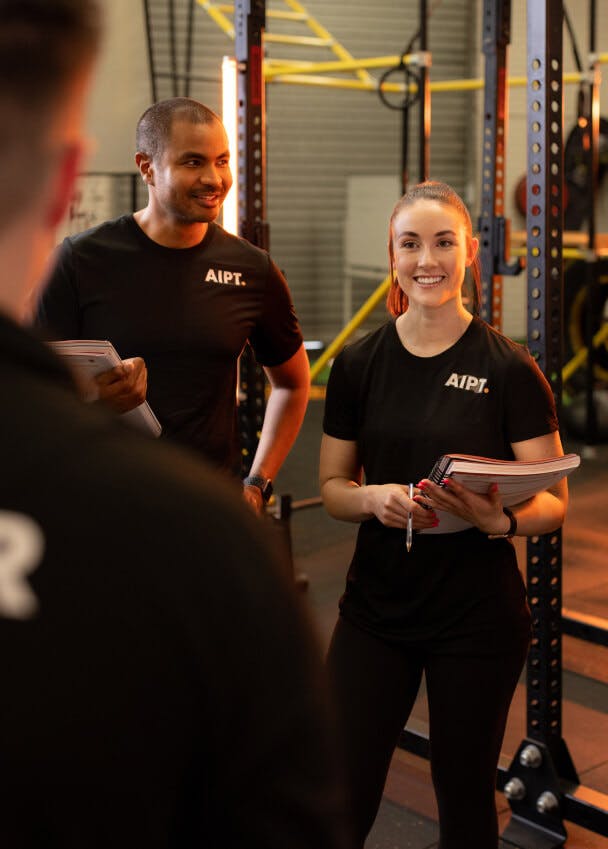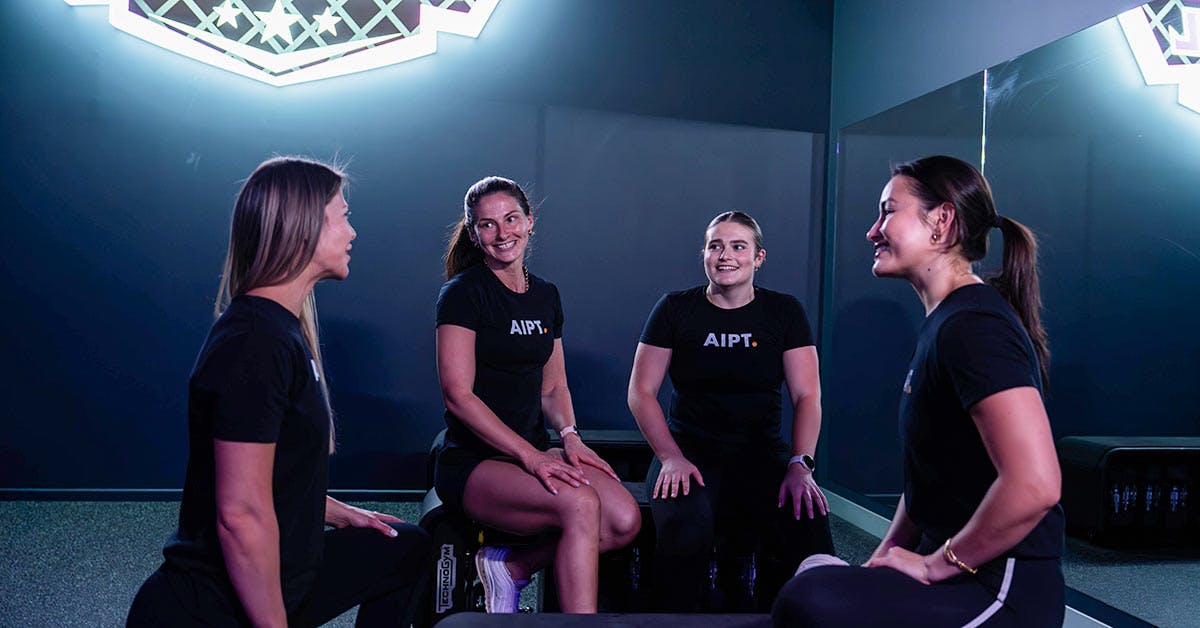03 May 2019
Meet Corey Neil
AIPT Student Corey Neil has a remarkable story that he has chosen to share with us.
I grew up on a farm located 60km North/West of Ballarat in Victoria and worked on the property from a young age.
I went to boarding school in Ballarat from the age of 11 and found myself involved in most of the sports the school had to offer, including; football, cricket, rowing, athletics, and cross-country. During my final years of school, I was heavily involved in weight training and boxing.
In 2003 I joined the Army Reserves as a Rifleman as there were no full-time positions available at the time. I was awarded best at physical training on completion of basic training and completed my initial employment training to become a fully qualified Rifleman.
I started off working as a Technical Officer in the civil engineering department of the Pyrenees Shire Council, Beaufort, Victoria. I worked there for two and a half years, always with the ambition of serving full-time in the Australian Army, which I finally managed to make happen in 2007 when I was posted to 5RAR Darwin.
I was aspiring to complete selection for a Special Forces unit and had been preparing physically since I had first joined the Defence Force. I would never make the assumption that I would have been selected, as the main aspects that are scrutinised are mental characteristics which are put to the test while in an exhausted, hungry and sleep deprived state. An individual doesn’t know how they will respond to these kinds of stresses until placed in that situation, but that was the goal I was aiming for. I found that soldiering suited me quite well, and having grown up around firearms, I’d had plenty of practice shooting over the years, which enabled me to qualify as one of two Marksmen of our platoon.
I also made some great mates along the way which provided for some really memorable moments, especially when out on exercise. After approximately 4-5 months, I became aware that I was suffering from depression which was non-service related and wasn’t brought on by any specific event, which caused me to withdraw my application for SF selection. I ended up discharging from the Army towards the end of 2008, and I honestly didn’t have a plan B; being a soldier was all I wanted out of life.
I returned to Victoria and completed a learner course in shearing, which I threw myself into and I was soon back on my feet. Feeling as though I had beaten depression, my desire to chase that SF dream returned and I decided to join the French Foreign Legion as I couldn’t re-join the ADF.
I followed an intense training regime right up until I left for France and felt both physically and mentally prepared for the challenges that training would throw at me. My preparation really spoke for itself when I was selected in the top few recruits out of 140 candidates from around the world, of which 70 made it in.
I finally felt like I was where I was meant to be, but this feeling was short lived as I soon crossed paths with a Legionnaire who was ex-3 Para (parachute regiment in the UK Army) from England. In conversation, he quickly brought to light the fact that the Legion was not the elite fighting force I had been led to believe from the research I had carried out prior to joining. I took what he had to say on board, but I had already gone to the trouble to get to where I was, and I decided that I would stay until I came to that conclusion myself. I ended up staying for over two and a half months, but I found that their standard was below that of the Australian Army and that they relied heavily upon their reputation in order to attract potential recruits. It wasn’t an easy decision to leave, but I knew that it wasn’t the role I had been striving for, so that concluded my time in the Legion.
Once I returned to Australia, I went back to shearing and this particular vocation suited my situation best as I continued to battle depression because it enabled me to work while I was travelling well and then I was able to cease work and could survive off the money I had made when I was in a rut.
At the start of 2012, I decided to head up to QLD to work on a cattle station, mostly because I thought I could somehow leave the depression behind and start afresh. Everything was great for a couple of months but then the black dog was back again. I had suicidal thoughts most days and found myself sitting down on the edge of my bed with the barrel of my rifle under my chin on numerous occasions. The only thing that prevented me from doing the job was knowing the pain and suffering I would transfer to my mother and sister who certainly didn’t deserve to bear that burden, but it’s an isolating illness so you’re constantly fighting an internal battle. I just want to point out the fact that I’m not an overly dramatic person, and I never felt like a victim, but this illness wears you down and it almost felt like the harder you fought it the worse it got. I left the cattle station after approximately 6 months to return to Victoria.
I took on some shearing until the end of 2012 and was then placed on a different medication which really did a number on me which I was lucky to get through the first few weeks. Once I felt semi-normal I joined up at a local gym and it really made a huge difference in my day to day life.
I had continued to train since leaving the Legion, such as running, boxing, and resistance training, but it was always on my own and intermittent depending on the ups and downs. I always looked forward to attending the gym, catching up with friends and getting in a good session. This is also where I met my current partner Hayley who was the actual manager of the gym.
I worked in a couple of different jobs in 2013, driving a concrete truck and working in a McCain’s factory, but these were short-lived with the illness tearing everything apart. I went back to shearing in 2014 and managed to have a relatively productive year work wise but I wasn’t able to get to the gym anywhere near as often and the depression seemed to get worse in the last half of the year. This culminated in an event where I wrote a ‘final’ letter to Hayley and drove out to the farm where I grew up. I walked up the hill that I had spent much time pack marching up and down in preparation for the Army and the Legion and sat down with my rifle next to a stone wall that I had built while training. I was just about to go through with it when I had a moment of clarity, realising that I was at my lowest possible point and I had absolutely nothing to lose by continuing to live, but at the same time, I knew that it was going to be a long hard road coming back from this.
Soon after this incident, a Psychiatrist I saw advised me to cease taking the medication I was currently on as they believed it was making matters worse. I weaned myself off the medication as directed and also managed to quit smoking at this time which had been a crutch since my time in the Army. I returned to the gym, and this was the major turning point for me in overcoming depression, and I made a full recovery from the illness.
My partner and I welcomed our son Isaac into the world on the 7th Oct 2016, and I honestly had to pinch myself as I had previously been adamant that I would never have children due to suffering from depression, not wanting to have my illness negatively impact a child’s life. It never ceases to amaze me that regardless of the pressures that life can place on you, one smile from him makes it all worthwhile.
I have continued to shear for the last couple of years to get us ahead financially but have still managed to train consistently, mostly running as the job itself is a form of resistance training, sometimes dragging and handling 80+kg animals. I also managed to attend my first Anzac Day in 2017 since leaving the ADF, as I carried a lot of shame and guilt about letting down my mates when I was discharged. I tried to re-join the ADF (not as a Rifleman) on numerous occasions but was knocked back due to a history of depression. I do feel there is a negative stigma surrounding depression, with the belief that previous sufferers of the illness will never fully recover and can relapse at any time, especially when placed in stressful situations. I know first hand that this isn’t correct having been exposed to numerous incidents such as the traumatic birth of our son who went without oxygen for an extended period and required a blood transfusion after his umbilical cord snapped while he was stuck. He then spent a week in NICU in Melbourne and was on morphine while they kept him on a cool bed which lowered his body temperature to 34 degrees for 72 hours to prevent/reduce brain damage sustained from the oxygen deprivation.
I sustained viral meningitis last year from a bug I picked up from Isaac and was in the hospital for a week. Against recommendations, I returned to work a week later, I developed a stutter from the brain trauma as well as memory loss, reduced cognitive functioning, loss of coordination and migraines (which subsided after a few months). I then came down with strep throat about three weeks later which developed into something else, and I ended up back in the hospital with an internal haemorrhage which required lower abdominal surgery. I remember the doctors informing me that there was a high probability it could be cancer and seeing the disbelief on their face when I asked them how long it would be until I could get back to work. I think many parents out there will have a similar perspective, that concern for your child’s future comes before your wellbeing or longevity. As long as you’re doing the best that you can to give them a better tomorrow. Regardless of the above situations, I have continued to enjoy waking up every single day and feel grateful to have the life I have and to share it with those I hold dear.
To take the focus away from myself, there are soldiers who I served with in the Australian Army who has been on numerous deployments and sacrificed time with partners and children and missed children’s birthdays. Some of these individuals have had to battle PTSD and continue to do so with little to no support from DVA, placing extreme stress on both them and their families. There have been others in the ADF community who have taken their own lives leaving behind partners and children, demonstrating the severity of this illness and the catastrophic consequences that it has on an individual and their families.
Having witnessed the rate of suicide among ex-service members over the previous years and being aware of the positive impact exercise in a social setting had on my depression has motivated me to complete my Certificate III and IV in Fitness and strive to get involved in assisting veterans in some capacity to try to influence a reduction in this terrible statistic.
I know that it would be beneficial to have them regain a sense of community outside of the ADF by training and connecting with others who have walked a similar path.
I want to be able to utilise my experience relating to fitness, depression and time in the ADF to assist veterans by showing them there is a community out there that does genuinely care about the sacrifices they have made and is willing to help them move forward in life and show support during the tough times.
In closing, the most important factor for me is having the opportunity to demonstrate to my son that it doesn’t matter how many times we find ourselves flat on our face; we can choose to pick ourselves back up and hold out a hand to help others.
If you are struggling to pick yourself up, visit Beyond Blue or call 1300 22 4636.

Industry Supplier
Proud member of

© Australian Institute of Personal Trainers | RTO Number 32363

